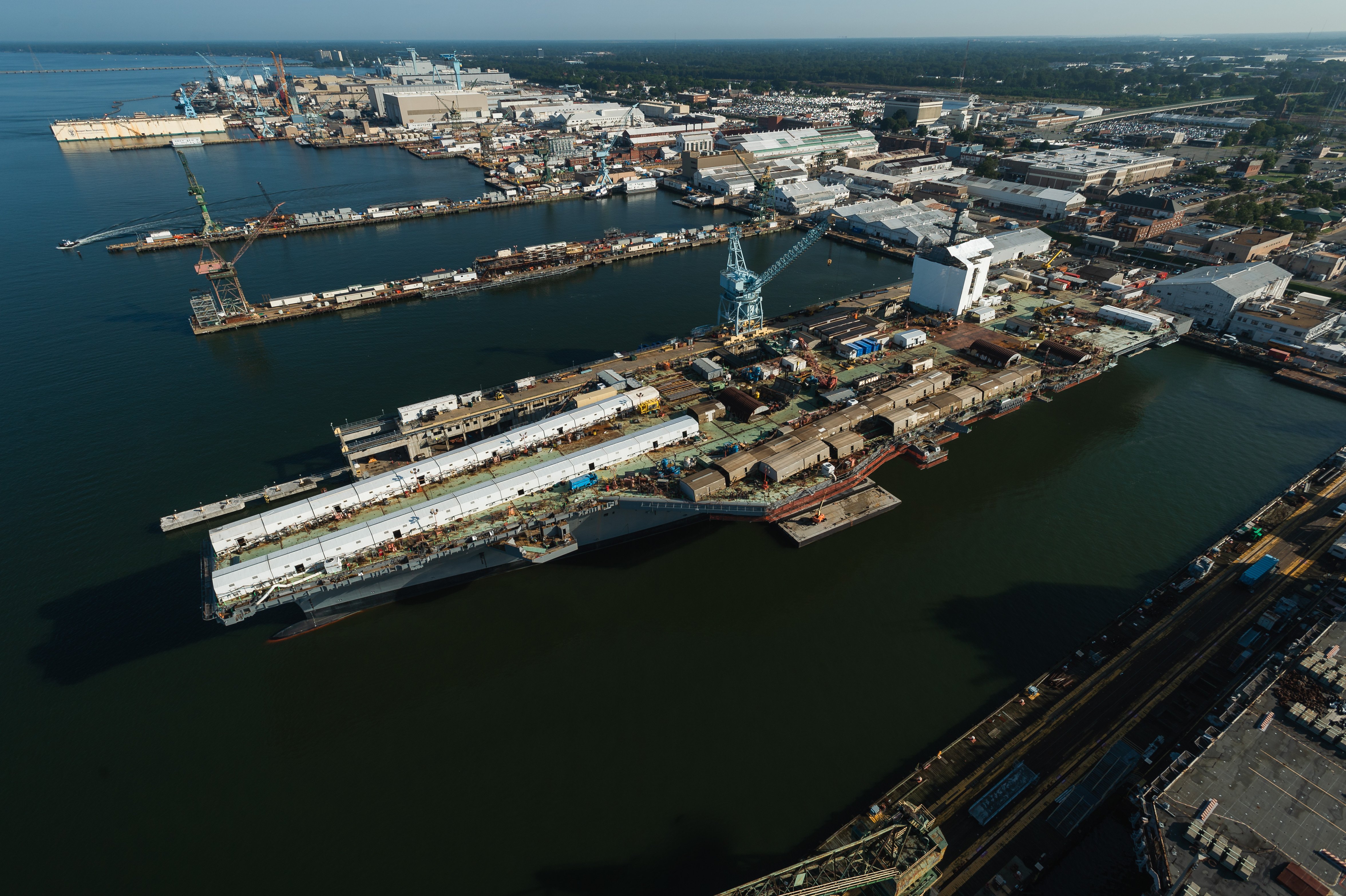
In this aerial photograph, the aircraft carrier John F. Kennedy (CVN 79) sits at Pier 3 at Newport News Shipbuilding division. The ship is approximately 76 percent complete and is progressing through final outfitting and testing. Huntington Ingalls Industries photo.
The Navy today issued a contract modification to move its next Ford-class aircraft carrier to a more traditional single-phase delivery, with the intention of getting the future John F. Kennedy (CVN-79) in deployable shape on a faster timeline.
JFK was previously slated to go through a two-phase delivery process, where the ship would be mostly completed and then the workforce at Newport News Shipbuilding would pause and install electronics and other modifications at a later time. This plan was unveiled in the Fiscal Year 2016 budget as a means of building the carrier on the most cost-effective schedule for the workforce at the construction yard but avoiding an overlap of JFK and USS Nimitz (CVN-68) in the fleet, which would put a strain on Navy budgets and personnel to operate both. By inserting a gap in construction and delaying final delivery, the ship would receive the most up-to-date technology just ahead of its entry to the fleet, once the fleet was ready to induct a new carrier.
However, that decision was made when JFK was expected to deliver in 2022 and the overlap between Kennedy and Nimitz would have been longer. The Navy is now eyeing a 2024 delivery for JFK regardless of whether it delivers fully outfitted or not.
The Navy today awarded Newport News Shipbuilding two contract modifications valued at up to $315 million combined to convert to a single-phase delivery and to install F-35C Lightning II Joint Strike Fighter modifications ahead of delivery.
“The Navy is transitioning to a single-phase delivery approach to meet both Fleet requirements and a congressional mandate of ensuring that CVN 79 is capable of operating and deploying Joint Strike Fighter (F-35C) aircraft before completing the post-shakedown availability as codified in Section 124 of the fiscal 2020 National Defense Authorization Act (Public Law 116-92),” reads the contract announcement.
“The single-phase delivery date is planned for June 30, 2024.”
“The contract action announced today revises the two-phased delivery approach originally planned for the second ship in the Gerald R. Ford-class of carriers. It comes as a result of extensive collaboration with the Navy to support legislative requirements for Kennedy to be delivered with its complete warfare system, including F-35 Joint Strike Fighter capabilities, before the ship is commissioned into the fleet,” reads a news release from Newport News Shipbuilding.
“We are pleased to have worked with the Navy to adopt lessons learned in the construction of USS Gerald R. Ford (CVN 78) to improve cost, production and planning efficiencies on Kennedy,” Lucas Hicks, Newport News’ vice president of new construction aircraft carrier programs, said in the news release.
“We believe that the single-phase approach ensures the most effective build plan for all remaining work and provides the best value for the Navy by supporting its ability to accelerate operational deployment of this maritime force asset.”
Navy acquisition chief James Geurts “has been driving a single-phase delivery strategy for JFK that included F-35C capabilities to achieve the most efficient path to delivery as compared to the baseline two-phased delivery” plan the Navy had previously planned, Navy spokesman Capt. Danny Hernandez told USNI News.
“He feels single-phase will deliver a more capable and lethal ship to the fleet.”
This new plan, he said, will deliver a more capable ship to the fleet and hasten its ability to get trained up and out on deployment. If the F-35 modifications were done during the ship’s post-shakedown availability, that maintenance period could run longer and could delay the ship from starting workups for its maiden deployment.
The new plan represents “no impact to JFK’s baseline delivery date in 2024,” but at the time of delivery the ship will be complete and will be F-35C-compatible. According to FY 2016 budget documents, the ship would have had its initial acceptance in 2022 and then final delivery in 2024. This new conversion to a single-phase delivery maintains the 2024 delivery timeline.
Lawmakers in June 2019 were angered when they were told that the Ford-class carriers would be built and delivered without the ability to support the F-35C. In the FY 2020 National Defense Authorization Act they required that JFK be made F-35-compatible by the time it completes its post-shakedown availability following its final tests and trials.
At the time, Hernandez told USNI News that “the Nimitz-class and Ford-class aircraft carriers, by design, can operate with F-35Cs; however, there are modifications to both carrier classes that are required in order to fully employ the capabilities of the F-35s and enable them to be more effective on a full-length deployment. … These F-35C modifications for CVN-78 and CVN-79 are currently scheduled for a future post-delivery modernization maintenance period that will occur prior to the planned F-35C operations on those carriers. This has always been the plan for CVN-78 and CVN-79 over several budget cycles. CVN-80 and CVN-81 will be constructed with those modifications made during construction and will not require a post-delivery modification.”
Now, rather than waiting until post-delivery maintenance availabilities, Kennedy will undergo the F-35 modifications during construction and will be delivered to the Navy with the computer systems that support F-35 logistics and sustainment, data collection and more.
According to Newport News Shipbuilding, Kennedy is approximately 76 percent complete. The ship was launched in December 2019 and is undergoing further outfitting and testing.
